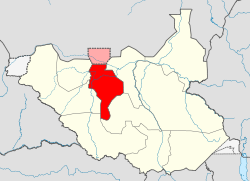Warrap state bans foreigners from riding commercial motorbikes
September 5, 2013 (KUACJOK) – Police authorities from South Sudan’s border state of Warrap have banned, with immediate effect, all foreign nationals from operating motorbike services, locally known as boda-boda.

Alfred Deng, a traffic police officer in the state capital, Kuacjok, said all institutions in the state have been notified of the order, clarifying that the directive does not expel foreign nationals living in the area.
“These are purely security measures to reduce growing crimes and traffic accidents in urban towns. They should not be misconstrued to mean expulsion of the foreign nationals”, Deng told Sudan Tribune on Thursday.
He said the state government would provide necessary security support for those wanting to return to their home countries with their motorbikes, in the event they are not able to sell them prior to their departure.
“Our responsibility does not go beyond implementing national directives to ensure that no foreign nationals are involved in [the] motor riding business. The question of what will the authorities do with their motorbike is not out of mandate. It is up to them (foreign nationals) to decide, whether to sell away, find someone who is a national of South Sudan to use it, or go with it. Our mandate is to ensure they stop”, Deng said.
He was reacting to a question put to him asking what the government intends to do with motorcycles left behind after their owners return to their home country, as well as whether those who wish to return by road will be permitted to do so on their motorbikes.
Juba is home to a number of foreign nationals from neighbouring countries such as Kenya, Uganda, Tanzania, Rwanda Burundi and the Democratic Republic of Congo who are involved in the motorcycle business.
“It depends on where those wanting to take their motor bikes want to go”, he said.
“We have also seen a small number of our brothers from Sudan, especially those from Darfur and other parts involved in [the] motorbike business. We will not ask them to go if it is not their plan, but if they want, we will provide [the] necessary security support up to where they want to go” , he added.
Deng said those found to be disobeying the order would be issued with a warning only during a one-week grace period, after which penalties would be more severe.
Boda bodas have become a popular form of transport in South Sudan, but drivers have been accused of participating in robberies and other criminal activity.
Deng said the ban was necessary to protect local jobs and businesses.
“You know, there are things which foreign nationals can do and those which can be done by nationals from the host country. For example, a foreign national can be an investor; can be a university lecture, can be instructor at any national institution, anything which the national government thinks require expertise. But things like cleaning, driving, motor riding, a waiter or waitress in hotel, things like this can be done by the local people”, he said.
The decision to ban the taxis has led to fears of retaliatory attacks on South Sudanese living in Uganda, with police there saying they had stepped up security measures to protect South Sudanese nationals and their property in the country.
The ban has left about 1,600 Ugandans, who were operating in Juba and other parts of the country as boda boda drivers, jobless.
Many of those affected have decided to return home over the past week, making the nearly 600-kilometre-long journey from Juba to Kampala by motorcycle.
(ST)
